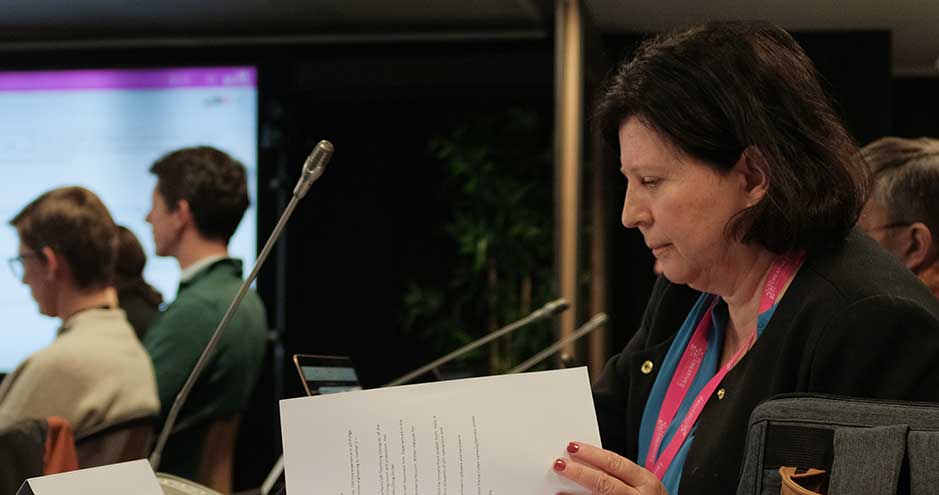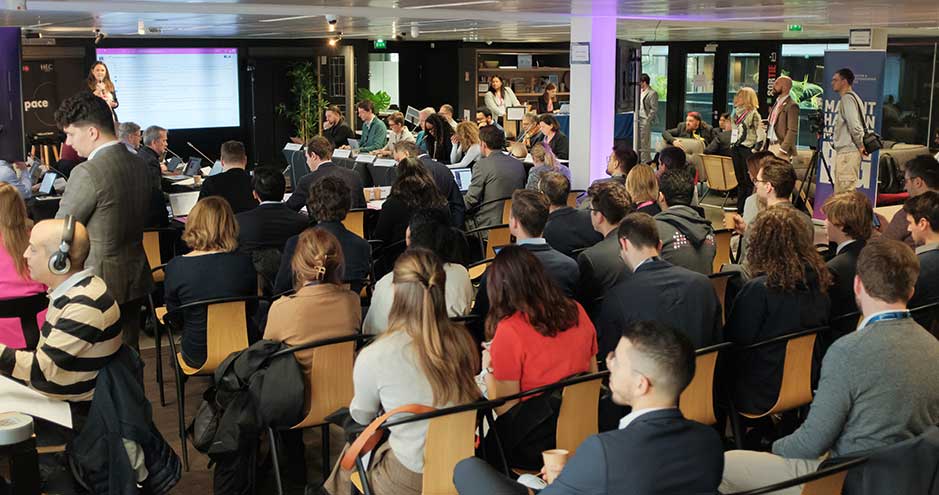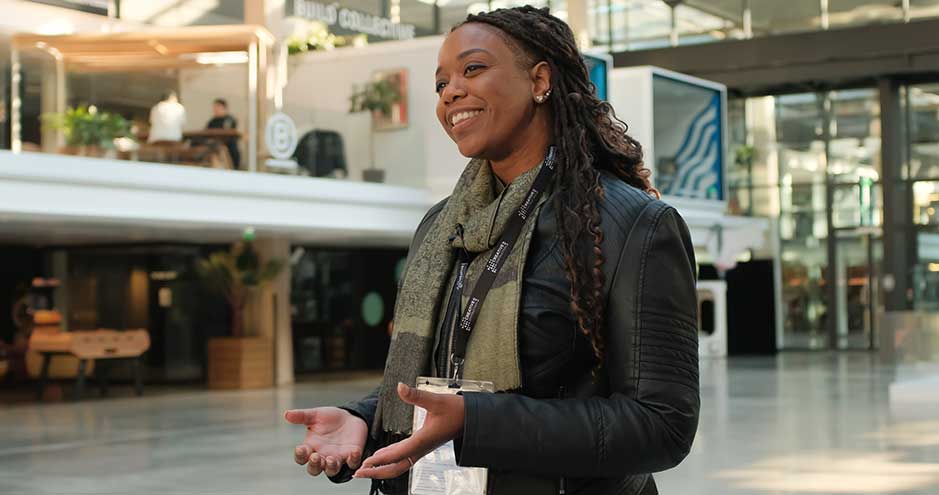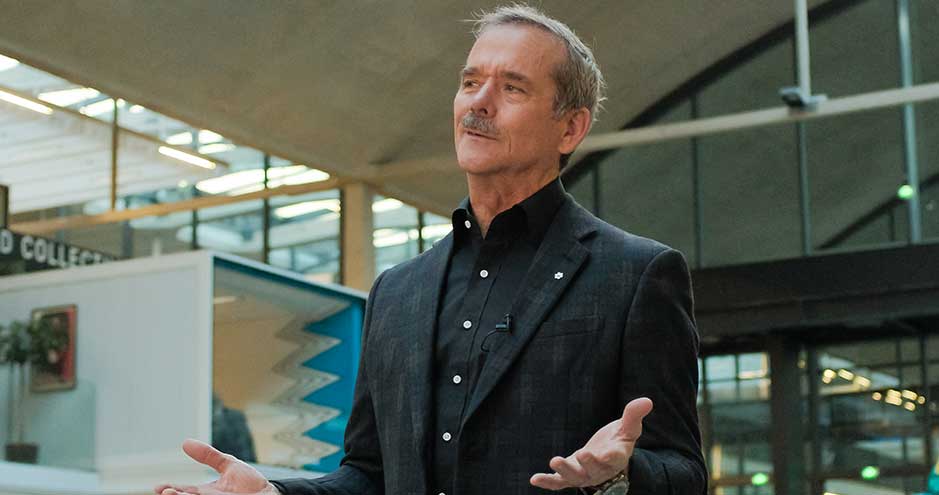Home Stretch for First-ever CDL Space Stream
The first-ever Creative Destruction Lab (CDL) Space stream enters its fourth and final session on April 12 with a 10-hour online exchange between mentors, students and startup companies. On the eve of this final session, we look back at the highlights of Session 3, hosted by HEC Paris and set for the first time at Station F, central Paris. The February session was a moment to announce that a fourth faculty, CDL Oxford – Saïd Business School will join their ranks in September.
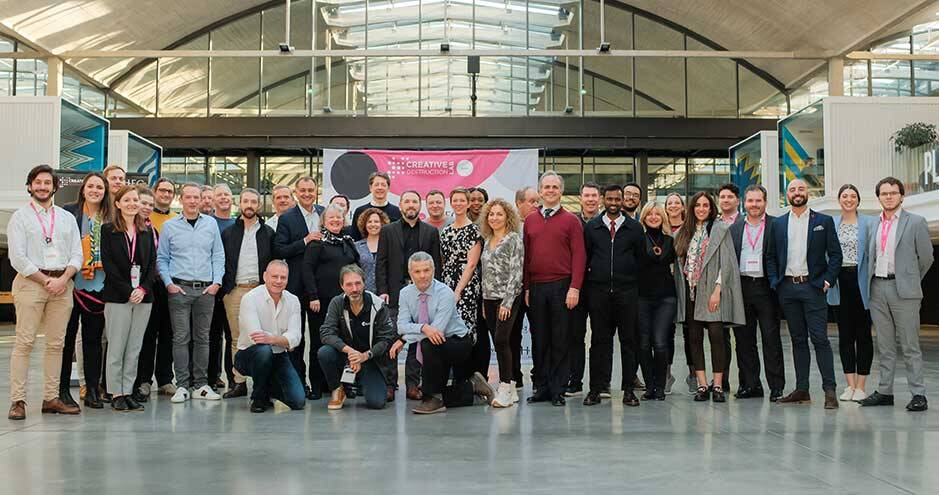
“Earth is the cradle of humanity, but one cannot live in a cradle forever.” The words spoken in 1911 by Russian space dreamer Konstantin E. Tsiolkovsky seemed to mirror the commitment by participants at the third session to reach out to space. The pioneering CDL Space program and its Paris baptism in Station F lasted two days in February 2023 during which scientists and entrepreneurs - representing ventures with names like Eternal Light Phototonics, ION-X or AiRANACULUS, - articulated their visions. As the CDL founder Ajay Agrawal explains, this is part of a seed-stage program designed to massively scale science- and technology-based companies, thus enhancing the commercialization of science in a very competitive global market.
Since September 2022, HEC Paris has joined forces with Rotman School of Management and Georgia Tech to guide and support startup companies and their projects for space. Nathalie Riond is the Academic Director of the school’s impact programs and is driving the interaction between CDL’s space stream and the school’s MBA students: “This is an extraordinary opportunity for them,” she explains during a short break on the opening day. “They are at the heart of these cutting-edge yet nascent companies and their activities. Our students see these operations close up and are introduced to a very high level network which will only stand them in good stead for the future.” Riond insists on the geopolitical impact of the program: “It’s vital we exist in this sector,” she says, drawing on her experience in the HEC ESA Lab Chair program. “This stream in some way helps to counterbalance the domination of the United States by playing on our strengths and improving the sectors where we are behind, such as the supply chains. This will hopefully balance out the positive and negative externalities.”
Sparkling Initiatives
The unique nature of the Global CDL Space Stream coincides serendipitously with a positive economic evolution which, according to Agrawal, will see a fall in the cost of delivering assets by 30 to 50 times. Hence the popularity of a program which is anticipating this “new world” and which has drawn participants from seven countries ranging from Japan to India, via the UK, France, Israel, the US and Canada. And little wonder: with almost $1 billion in equity creation since 2012, CDL startup ‘graduates’ have proven the value of this unique mentorship program.
Unsurprisingly, the competition is fierce and the demanding nature of CDL-Space has seen 23 startups out of 40 unable to keep up with the rigors imposed by the nine-month seed-stage mentorship program. Graham Ryland is the CEO and co-founder of Build Beyond, a California-based company working on space automation. His startup has so far weathered the CDL demands with energy: “Actually, this program is a bit like Survivor Island,” he says with a broad smile. “Companies have to accept that they could be cut along the way. The pace is very fast and you have to quickly gain insights and directions from your mentors on where you should go; meanwhile, they’re trying to decide whether we’re a good fit for what comes next. But, stay or leave, the benefits are always positive and we’ve seen startups who’ve left but gone on to great things.” Ryland’s company is building a device to harvest waste metal in orbit to recycle into components in space. Since the previous session, it has been able to establish a new partnership with a Californian railroad company that welds railroad tracks together: “Funny, when you think of this age-old industry, you don’t think of the future. But it may be the key to funding and bootstrapping us to the space age.” And the robotics engineer goes on to describe “sparkless welding process” which controls rising temperatures and could be used in terrestrial industries like those building pipelines.
Community Strength and Student Input
These informal yet informative exchanges at Station F didn’t escape the attention of HEC’s Director of Deep Tech, Aymeric Penven. “Scientific research is a global playing field,” he explains. “And, for that reason, deep tech entrepreneurship is global by nature.” The joint program by HEC Paris, Rotman Business School and Georgia Tech is to see the arrival of a fourth partner in September, Saïd School at the University of Oxford (see below). “The CDL-Space is the perfect embodiment of this spirit. By gathering mentors, ventures founders, faculty and students from all over the world, we witness the strength of this community. I’m always impressed, if not surprised by the quality of the discussions that these meetings catalyze, be it during the sessions or in the breaks.”
Melanie Juruena is one of those dozen students hailing from the program’s institutional partners. She’s been at HEC since January 2022 and is dedicating 100 course hours to accompanying the scalable companies in the CDL program (one-third in the classroom, two-thirds in the role of consultant to her startup clients). “I joined this Space stream because of the vast potential that space exploration can bring to humanity,” Juruena says under Station F’s vast entry dome. “How often do you have the possibility to network with space investors, astronauts, scientists, innovators and professional mentors in such a short space of time?” Since September, Juruena has been working with a Japanese startup with high ambitions: “Solving the bottleneck of telecommunication and destined to commercialize the world’s first inter-satellite optical communication network for Earth Observation satellites.” One of seven HEC students on the program, the former commercial business development manager from Manila, the Philippines says it’s important to translate the theoretical work explored in the classroom into concrete actions: “Since the beginning of the year, I’ve been helping with the pitch deck, in other words building up a value proposition on the business model, market sizing to make it fit the European market.”
"But,” Juruena adds, “what resonated most in me was the company’s passion for women empowerment and its drive for sustainability. I came from a male-dominated construction industry in Manila. Okay, the space sector is still a male-dominated one, I admit, but that’s kind of exciting. There are many opportunities in the sector, from agriculture to construction and outdoor activities. It’s unlimited!”
Bringing in the Oxford Touch
The fourth institutional addition to the CDL Space family was represented at Station F by Sarah Barratt Ball and Kutlu Kazanci. According to CDL Director Barratt Ball, the global program answers “an insatiable appetite” to be entrepreneurial in her institution: “Our MBA has 350 students and they get no credit for being part of the CDL. Yet, I’m still way oversubscribed with over 200 students applying for next year’s program alone. They realize that coming to these incredibly focused events can only enhance their entrepreneurial skill set and experience. We’re witnessing wonderful exchanges of judgment, ideal for the next steps of their career.” Scheduled to integrate the stream in September 2023, Oxford will be the next European hosts for CDL Space, in a session penciled in for March 2024. For that event, Saïd Business School is likely to build on the 250-strong ecosystem its ventures operations have created over the past four years. These includes collaborations with the likes of the Alan Turing Institute and the Francis Crick Institute.
Kutlu Kazanci has been overseeing the school's venture operations since 2019. He's the Associate Director of CDL Oxford: “The city of Oxford began its AI program four years ago. It's currently devoted to fintech, health and cleantech. My work involves scouting selection and handholding in a field where Saïd Business School has already been quite active in research and coordination work for space.” So, what does Kazanci hope the CDL partnership will bring? “It’s a unique global program and it can help us scale up the UK’s early stage businesses, giving them access to other markets.”
Going Beyond the Mentor-Mentee Relationship
Such developments dovetail promisingly with the objectives of the CDL Global Space stream. Lydia Turkie is the Managing Director of CDL-Atlanta and CDL-Toronto. She believes that, by 2026, CDL-Space will have transformed over 150 space-related projects into profit-oriented companies, aiming to collectively raise over $200M in equity financing: “This is a defining moment in my career,” Turkie admits, “and a testament to my passion, commitment and roots, making a difference in the world and accelerating what is best in humanity. The interactions we aim to build go beyond the mentor-mentee relationship. In the programs, we cultivate a culture of cross-Atlantic synergy, bringing our global space community from the Atlanta ecosystem together with peers from Paris, Toronto and – soon – Oxford, to further push the boundaries of space innovation.” Indeed, in Atlanta, Georgia Tech has acquired a reputation as a topnotch academic and technological institution for aerospace engineering, making it the ideal setting for ambitious space-focused companies.
This is confirmed by another engaging and articulate woman leader at the Station F gathering, and one of two star astronauts present, Anousheh Ansari. The Iranian American engineer made history in 2006 by being the world’s first self-funded woman to fly to the International Space Station. Ansari’s involvement with space goes back to the early 2000s with the XPrize Foundation. This is the world’s leader in incentive competitions to solve humanity’s grand challenges – a Foundation she now heads as CEO. “In 2004, we launched a competition that opened up commercial space activity. And the reason I’m involved in the CDL is because I saw the power of entrepreneurship in this field. CDL is one of those organizations that empowers entrepreneurs, supports them and puts them on a path to success with the right type of support and mentorship. There’s a real buzz here. I’m impressed by the diversity of solutions and technologies being presented, from launch capability to thrusters, to encryption and applications.” The engineer’s personal focus is on space debris removal, remediation and technologies designed to capture or salvage objects in space. “I’m not only here to mentor projects but to scout and - why not?- invest in projects that show promise. The CDL is invaluable, we learn about what’s happening beyond the US. It gives me a general sense of where the attention and growth is in the space market and space investment. And the entrepreneurial side helps to ask the hard questions about monetizing science. Engineers sometimes can be so enamored with technology that they forget the business side of space.”
Europe’s Potential
Hard questions were also being asked by another North American mentor at the Station F meet. Lauren Lyons has an impressive record as startup adviser, engineer and corporate operations consultant. For years, she has been driving policies to put business models at the heart of the space sector. “We have to get serious about this business,” she says, “and this stream can be a means to bridge the gap between the two sides of the Atlantic.” The former COO of Firefly Aerospace pauses: “I find it interesting that Europe is, well, 10 to 15, maybe more, years behind the US in terms of a culture around investing in space. But, fear not: by discovering some companies here, I feel the acceleration to our level can be much faster than once imagined. The cost of launch is so much cheaper and you can launch spacecrafts, learn and collect data, without doing the simulations we had to go through. So, I think Europe is going to advance much faster than the US did. On top of that, significant amounts of funding are available here – through Ministries of Defense, commercial customers, and so on. This will allow companies to attract incredible talent. And there are so many incredibly talented engineers in Europe who can’t work in the US because of ITAR. Now, this talent is being unlocked.”
This enthusiasm was shared by one of the stars of the two days, Chris Hadfield. The highly decorated Canadian astronaut and author leads the CDL-Space international tech incubator. During his presentation, Hadfield insisted on what for him is one of the fundamental goals of CDL-Space: distributing the power needed to make Earth sustainable for the 10 billion inhabitants that could people it in a few generations: “It’s not going to just happen because we hope it will, we actually need to take advantage of all the various technologies to provide a good quality of life in a sustainable manner. This is helped by the drop in price: where it used to cost over $50,000 a kilogram to launch a space shuttle, it costs $1,500 a kilogram for the (Space X’s) Falcon Heavy that launched in 2022. As (former) French Air Force General Philippe Adam said (in February 2023), innovation in space today is on the civil side. We’re going to look for this innovation among all the startups with their boundless imagination to create services we never would have dreamt of.”
These ambitions go one step further on April 12 with the fourth and final CDL-Space session. The 17 remaining ventures will be exchanging online with 32 mentors. This is followed on June 13-14 with a Super Session starting on June 13 when companies from the 12 CDL sites in the world come together in Toronto to showcase their advancements after the nine-month program; to discuss early-stage financing and investment; to reveal technological breakthroughs to an international audience; and to explore international partnerships with suppliers and customers.
